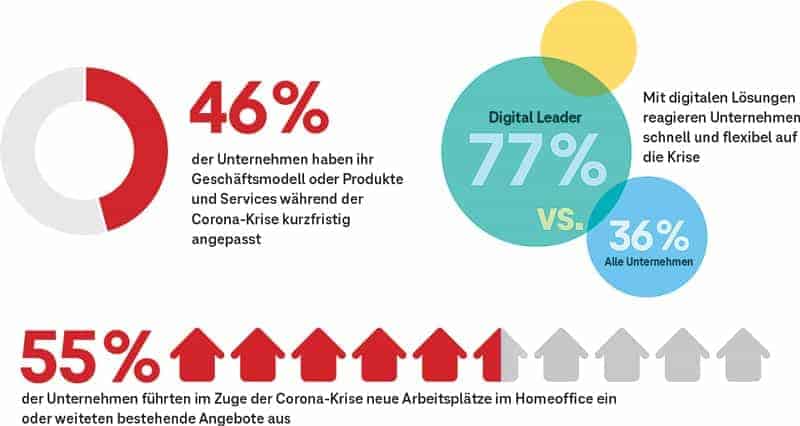

46 percent of the companies surveyed made short-term adjustments to business models, products and services during the corona crisis. More than half introduced new home office workplaces or expanded the offering. Almost three quarters offered their employees the opportunity to work in a home office. These steps have accelerated digitization in the German SME sector overall. The pace is particularly evident in productivity.
Digital transformation reaches a new high of 56 index points and an increase of four points compared with the previous year. Examples include improved work processes and structures. Mobile and flexible working make it easier to transfer workplaces to home offices. There, teams are physically separated from each other and yet work together efficiently.
Tools for collaboration and more efficient processes were therefore in particular demand. Companies invested in mobile devices and mobile business applications in the short term. This has driven digitization as a whole. The healthcare, service and retail industries are also increasingly using digital solutions. The relationship with customers does not ask for lockdowns.
Many companies therefore use digital channels and social networks for contact. They market their products and services there. In this way, companies communicate cutting-edge offers and provide advice via video. This seems to have been largely successful: The index score for the area of relationship with customers is up three points year-on-year to 58. Many SMEs have also further developed their business models with digital products. Here, too, the index value rises by three points to 51.

Data protection and security remain consistently important with 68 index points. The corona crisis also forces a balancing act between saving and investing. Declining sales and limited budgets lead to clear priorities for investments. These include mobile devices, tools for communication and collaboration, and VPN solutions. Also in focus: data protection and security. T
ools in the cloud, private WLAN and unsecured workspaces in the home office pose new dangers. Despite the crisis, 60 percent of companies are sticking to their IT budgets. In contrast, 18 percent of companies are putting their investments on hold for the time being. These companies are mainly found in sectors that have been hit harder by the crisis, such as the hospitality industry.






